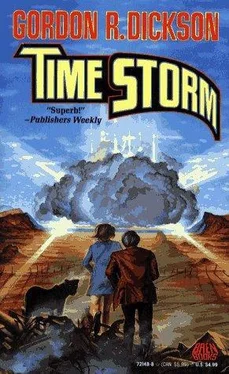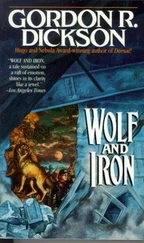Gordon Dickson - Time Storm
Здесь есть возможность читать онлайн «Gordon Dickson - Time Storm» весь текст электронной книги совершенно бесплатно (целиком полную версию без сокращений). В некоторых случаях можно слушать аудио, скачать через торрент в формате fb2 и присутствует краткое содержание. Год выпуска: 1992, ISBN: 1992, Издательство: Baen Books, Жанр: Фантастика и фэнтези, на английском языке. Описание произведения, (предисловие) а так же отзывы посетителей доступны на портале библиотеки ЛибКат.
- Название:Time Storm
- Автор:
- Издательство:Baen Books
- Жанр:
- Год:1992
- ISBN:0-671-72148-8
- Рейтинг книги:4 / 5. Голосов: 1
-
Избранное:Добавить в избранное
- Отзывы:
-
Ваша оценка:
- 80
- 1
- 2
- 3
- 4
- 5
Time Storm: краткое содержание, описание и аннотация
Предлагаем к чтению аннотацию, описание, краткое содержание или предисловие (зависит от того, что написал сам автор книги «Time Storm»). Если вы не нашли необходимую информацию о книге — напишите в комментариях, мы постараемся отыскать её.
Time Storm — читать онлайн бесплатно полную книгу (весь текст) целиком
Ниже представлен текст книги, разбитый по страницам. Система сохранения места последней прочитанной страницы, позволяет с удобством читать онлайн бесплатно книгу «Time Storm», без необходимости каждый раз заново искать на чём Вы остановились. Поставьте закладку, и сможете в любой момент перейти на страницу, на которой закончили чтение.
Интервал:
Закладка:
The answers were unhesitating and interesting. His full name was Techner, pronounced “Tek-ner,” Wilson Ambervoy—he had been named for a couple of grandparents. He had been good enough as a high school football player to get a scholarship to the University of Indiana—and Indiana had fielded a Big Ten team which did not play mediocre football. However, he had not taken the study end of college seriously and had flunked out midway through his sophomore year. Luckily—he was usually lucky, Tek told me frankly—he got a job immediately with an uncle who owned a paint store. The uncle was in poor health and inside of half a year, Tek was managing the store. About that time, he got into real estate. With the cosignature of his paint store uncle, Tek swung a mortgage and bought a twelve-unit apartment building. To run it, he brought in a friend named Ricky, a drinking buddy the same age as himself, who had a knack for card games and was in the habit of having a poker session in his former bachelor apartment every night after the bars closed.
He and Tek remodeled two of the apartment units of their building into one large one to make, as Tek put it, “a pretty impressive-looking cave”; and the after-hours card games expanded. Meanwhile, they made it a point to rent the rest of the units to girl friends of Tek’s; and a number of these would also drop in on the card game after hours to make sandwiches, pour drinks and watch the game. If the supply of these girls ran short, Tek went out prospecting and found some more.
The result was that there were always a number of good-looking girls around the card game, and young male strangers began dropping in for a hand or two, just to meet them. Tek’s buddy did well with his cards. He paid Tek a percentage of his winnings as rent for the apartment; and the other units became very much in demand among Tek’s girl friends, so that he was able to raise the rent several times and still keep every unit filled.
“You understand,” Tek said to me. “Nobody cheated in the card games. There was nothing professional about the girls. Just everybody had a good time, and Ricky and me had it for free —well, maybe we came out a little bit ahead, but when we did, we just spent it on more good stuff....”
And then the time storm had come along; Tek had been taking a nap. When he woke, he was alone in the apartment building. Alone in an empty town. He ended up going out adventuring, and one by one, he ran into the other men of his gang, whom he recruited out of a sort of pack-instinct for leadership.
“But that wasn’t really what I was after,” Tek said to me as we walked together, with the camp and the fire we always built for it distant in the twilight before the small town on the outskirts of which we had stopped for the night. “You know, even before this time storm, or whatever you call it, came along, I was beginning to get a little filled up on the apartment, the fun and games, and all the rest of it. I was beginning to want to do something—I don’t know what. I still don’t know. But just roaming around, living off the country, isn’t it either.”
Tek stopped and looked at me in the growing dimness.
“They’re not bright, you know,” he said, “those five back there I picked up. Garney was the brightest of them all; and he was nothing you could build on. Now, little old Bill Gault there, he’s bright; and you are, too. Someday maybe you’ll tell me what you did before this happened and where you came from; and I’ll bet it’ll be interesting. And this business of yours with the mistwalls—it might lead to something. That’s what I want. Something.”
He stopped talking.
“All right,” I said. “Let’s head back.”
Halfway back to the camp, I came to a conclusion.
“You can start carrying a rifle tomorrow,” I told him. “But don’t forget you’re still under orders. Mine.”
“Right,” he said. “But I’d be on your side anyway.”
“For now, you would,” I said dryly.
He laughed.
“Come on, man,” he said. “Anything can happen if you look far enough into the future. If anything comes along to change the situation that much, you’ll know about it as soon as I will.”
So we moved on with five gunners instead of four, and things went almost suspiciously well. The plan Bill and I had evolved was based on our theory that our best chance to get on top of the time storm was to keep looking for the most advanced future segment we could find. Hopefully the more advanced an area we could hit, the more likely we were to find the equipment or the people to help us deal with the time storm. If we were going to be able to do something about it, that was where we were most likely to find the means. If we were going to be forced to live with it—perhaps we could find the techniques and patterns we needed in something beyond our present time slot.
As I had discovered earlier, however, the time changes seemed to be weighed toward the past, rather than toward the future. We found three futuristic-looking segments behind mistwalls; but they were either apparently stripped of anything or anyone useful, or else their very futureness was in doubt. It was two weeks and two days before we found a segment that was undeniably part of a city belonging to a time yet to come—a far future time, we thought at first. Though of course, there was no way we might tell how much time would have been necessary to make changes.
This particular segment was behind the second mistwall we had encountered that day. The first had showed us nothing but unrelieved forest, stretched out over descending hills to a horizon that was lost in haze, but which must have been many miles off. Such a landscape might be part of a future segment, but it was not passable by our wheeled vehicles, and it promised nothing. We pulled back through the mistwall—it was then about ten in the morning—paused for an early lunch and went on.
About 2:30 P.M., we saw a second, stationary mistwall and moved up to it. We were travelling along a gravel road at the time, through what seemed like an area of small farms. The mistwall sliced across a cornfield and obliterated the corner of what had once been a tall, white and severely narrow farmhouse—an American Gothic among farmhouses.
We left our motorcade in the road, and Bill and I walked up the farm road into the farmyard, carrying most of the instruments. The rest straggled along behind us but stayed back, as I had repeatedly warned them to, a good twenty yards from where we were working.
I said the rest stayed back—I should have said all the rest but Sunday. The leopard had put up with seeing me go through mist-walls for about two days after he and the girl had rejoined us and had contented himself with overwhelming me with pleased greetings when I returned. Like all our humans, he obviously had a powerfully remembered fear of the time lines, in spite of having crossed one at Marie’s place. But after Bill and I had penetrated through the third wall we had encountered, I had heard something odd behind me and looked to see Sunday coming through the mistwall behind us, tossing his head, his eyes closed and mewling like a lost kitten. He broke out and came to me—still with his eyes closed and evidently depending on nose alone—and it had taken me fifteen minutes to soothe him back to quietness. However, going back through the mistwall later, he had been much less upset; and two days later he was accompanying us with the indifference of a veteran. Of course, as soon as he started coming through the mist-walls after us, the girl did too. But it was possible to order her not to; Sunday could not be kept back.
So, in this case, as had become his habit, Sunday followed Bill and me up to the mistwall and waited while we made our measurements and tests. These showed it to be little different from the many other walls we had tested. But when we finally went through this time, we found a difference.
Читать дальшеИнтервал:
Закладка:
Похожие книги на «Time Storm»
Представляем Вашему вниманию похожие книги на «Time Storm» списком для выбора. Мы отобрали схожую по названию и смыслу литературу в надежде предоставить читателям больше вариантов отыскать новые, интересные, ещё непрочитанные произведения.
Обсуждение, отзывы о книге «Time Storm» и просто собственные мнения читателей. Оставьте ваши комментарии, напишите, что Вы думаете о произведении, его смысле или главных героях. Укажите что конкретно понравилось, а что нет, и почему Вы так считаете.












